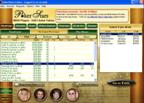
Internet Texas Hold'em
Playing at Limits Too High in Relation to Your Bankroll
 Matthew Hilger is a professional poker player and respected author. In addition to the many articles on his own website, he writes columns for CardPlayer magazine, PokerPages.com and PokerinEurope.com. Matthew's next book, Texas Hold'em Odds and Probabilities: Limit, No-Limit and Tournament Strategies, will be released in June 2006. Matthew's website is www.internettexasholdem.com hours and still only break even. Given any time below that, he could possibly lose despite the fact that he is a proven winner in the long-term.
Matthew Hilger is a professional poker player and respected author. In addition to the many articles on his own website, he writes columns for CardPlayer magazine, PokerPages.com and PokerinEurope.com. Matthew's next book, Texas Hold'em Odds and Probabilities: Limit, No-Limit and Tournament Strategies, will be released in June 2006. Matthew's website is www.internettexasholdem.com hours and still only break even. Given any time below that, he could possibly lose despite the fact that he is a proven winner in the long-term.
Looking at the luck factor from the other direction, a poor player who should normally lose $4 an hour could actually earn up to $1,000 over a 100 hour period by getting lucky!
Do these statements surprise you? As you can see, the “long-term” can be quite long indeed when talking about the luck factor in poker. A good understanding of the fluctuations that will occur playing Texas Hold'em is essential to your enjoyment of the game as well as to how you should manage your bankroll.
Because of the fluctuations in this game, it is essential to play at limits within your bankroll; otherwise, you risk going broke. For some people, they just keep digging back into their extra cash to keep playing but if you are on a limited bankroll you need to ensure that you protect it and play within the confines that your bankroll sets for you.
Many beginning players play at limits too high in relationship to their bankroll. Some of them will get lucky, start winning, and their game will improve enough to maintain the limit they are playing at. However, many will suffer the consequences and will find themselves broke and trying to figure out a way to explain to their significant other how they need some additional funding to keep playing.
How much do you need? As with many questions about poker it depends. It depends on how good you are, your style of play, and the type of game you play in. It is obvious that if you are a losing player there is no amount of bankroll large enough. Better players need smaller bankrolls as the negative fluctuations they experience will not be quite as large as say a player who barely breaks even. Aggressive loose players need larger bankrolls than conservative players as they will also experience more fluctuations in both directions. You need a larger bankroll playing in loose aggressive games than you do in tight passive games.
For many players, a good benchmark is about 350 times the big bet. This practically ensures that a good player will not go broke. However, it takes time to reach the skill level of a good player. Beginners should start out with even higher bankrolls.
One other criteria in setting your bankroll is how much risk you are willing to take of going broke. If you don’t mind increasing the chance of going broke by say 5%, you could play with less bankroll. Another strategy is to play at a slightly higher limit, but drop down a limit as soon as things start to go bad. The problem with this bankroll strategy is that many players do not have the discipline to do this. It is hard dropping down limits when you start to realize that it will take more time to get back to where you want to be. Nevertheless, this is a viable bankroll strategy for disciplined players.
My advice is to always have at least 250 to 400 times the big bet depending on how much risk you are willing to take and your willingness to drop down a limit if things go sour. If you are just starting out, begin with at least 500 times the big bet to get your feet wet to help you gain some experience before moving into higher limits. Like anything in life, to be successful you need to make a plan. Make a plan for your bankroll and the limits you want to play and stick to it. Be sure to have a plan “B” incorporated into the plan for stepping down limits when things don’t go as well as you had hoped.
The worst mistake one can make is playing at limits too high in relation to your bankroll. It is the worst mistake because the end result is that you won’t be able to play anymore. If you don’t mind going broke, then you can take more chances. But if you want to play poker for the years to come, you must ensure that you manage your bankroll effectively.
The next article will look at Mistake #7: Not Paying Attention

